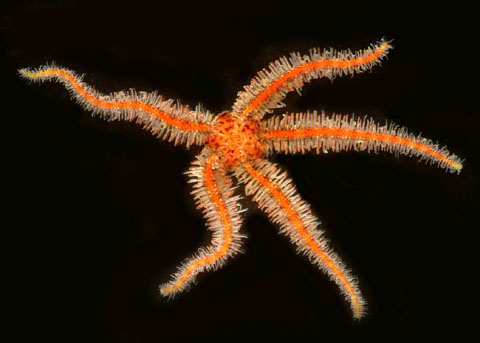 |
| A brittle star considering which foot to put forward |
By Sindya N. Bhanoo, The New York Times, May 14, 2012
Brittle stars are
sea creatures with five limbs and no brain. Found on the seafloor across the
world, they have no obvious front, unlike humans and most other animals. Now, a new study reports that the brainless
creatures are nonetheless able to move in a coordinated way, by designating one
limb as the “front-facing” limb, and using two others to propel forward.
“They are pushing forward
with the front two limbs, like a turtle,” said Henry Astley, the study’s author and an
evolutionary biologist at Brown University. “The back limbs aren’t highly
involved.”
Mr. Astley reports his findings in The Journal of Experimental
Biology.
Most animals, including humans, are bilaterally symmetrical. In other
words, drawing a line down the center results in symmetrical halves. A few
animals, brittle stars included, are radially symmetrical: They can be sliced
in many different ways and still be symmetrical, giving them no clear “front.”
But while moving, the brittle star is able to designate a front, and
act as if it is bilaterally symmetrical, Mr. Astley said. The brittle star is
also able to switch its front-facing limb as needed, and this enables it to
swiftly change direction, Mr. Astley said.
“If we turn when we’re walking, we have to change our direction,” he
said. “They just decide another direction is front, and they’re off.”
Scientists have long thought that bilateral symmetry confers an
evolutionary advantage, because it allows for directed movement when searching
for food or avoiding predators. But the new study puts a twist on this notion,
Mr. Astley said.
“You
can get the benefits of bilateral symmetry without being bilaterally
symmetrical,” he said. “You can become behaviorally bilaterally symmetrical.”
No comments:
Post a Comment